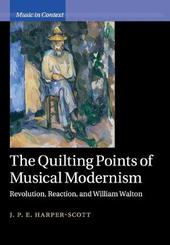
|
The Quilting Points of Musical Modernism: Revolution, Reaction, and William Walton
Paperback / softback
Main Details
| Title |
The Quilting Points of Musical Modernism: Revolution, Reaction, and William Walton
|
| Authors and Contributors |
By (author) J. P. E. Harper-Scott
|
| Series | Music in Context |
|---|
| Physical Properties |
| Format:Paperback / softback | | Pages:299 | | Dimensions(mm): Height 245,Width 169 |
|
| Category/Genre | 20th century and contemporary classical music |
|---|
| ISBN/Barcode |
9781108746830
|
| Classifications | Dewey:780.904 |
|---|
| Audience | | Professional & Vocational | |
|---|
| Illustrations |
Worked examples or Exercises; 26 Printed music items; 25 Tables, black and white; 1 Halftones, unspecified; 1 Halftones, black and white
|
|
Publishing Details |
| Publisher |
Cambridge University Press
|
| Imprint |
Cambridge University Press
|
| Publication Date |
30 January 2020 |
| Publication Country |
United Kingdom
|
Description
Modernism is both a contested aesthetic category and a powerful political statement. Modernist music was condemned as degenerate by the Nazis and forcibly replaced by socialist realism under the Soviets. Sympathetic philosophers and critics have interpreted it as a vital intellectual defence against totalitarianism, yet some American critics consider it elitist, undemocratic and even unnatural. Drawing extensively on the philosophy of Heidegger and Badiou, The Quilting Points of Musical Modernism proposes a new dialectical theory of faithful, reactive and obscure subjective responses to musical modernism, which embraces all the music of Western modernity. This systematic definition of musical modernism introduces readers to theory by Badiou, Zizek and Agamben. Basing his analyses on the music of William Walton, Harper-Scott explores connections between the revolutionary politics of the nineteenth and twentieth centuries and responses to the event of modernism in order to challenge accepted narratives of music history in the twentieth century.
Author Biography
J. P. E. Harper-Scott is Reader in Musicology and Theory at Royal Holloway, University of London. He has published widely on Elgar, Wagner, Britten and symphonic music and opera of the late nineteenth and twentieth centuries and his books include Elgar Studies (edited with Julian Rushton), An Introduction to Music Studies (edited with Jim Samson) and Edward Elgar, Modernist. His work has strong intersections with continental philosophy and psychoanalysis (Heidegger, Badiou, Zizek and Lacan) and has increasingly come to espouse an explicitly Leftist perspective.
|